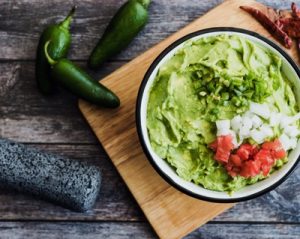By Hannah Six, Novant Health Healthy Headlines
To find and book a physician click here.
The foods we eat don’t just promote better health and prevent life-threatening chronic illnesses like cardiovascular disease, Type-2 diabetes and cancer. The science is clear: what we eat also affects our brain function, which influences our thoughts and emotions.

Jennifer Anderson
“Research shows that certain kinds of foods can be essential to your sense of well-being,” said Jennifer Anderson, a registered dietitian with Novant Health Heart & Vascular Institute and the program coordinator at Novant Health Wellness Center in Matthews. “Certain foods can even cause harm.”
Harnessing the mood-boosting power of nutrition is not hard and can help you feel noticeably better, she said. Armed with a little information, a few tips — and some delicious recipes — you’ll be ready to get started.
Sleep and inflammation
Food plays an important role in our day-to-day moods. For example, vitamin D helps increase our serotonin levels, which can help us sleep better and balance our moods, Anderson said. And folate, a B vitamin, helps increase dopamine production, which helps us feel focused and energized.
To keep our brains functioning well, we’ll want to provide the nutrients they need, including foods that protect them from damaging inflammation and free radicals (unstable molecules resulting from bodily functions or exposure to toxins.)
Eating a poor diet, on the other hand, can cause imbalances in your body that can result in damage to your brain tissue and affect your brain function and emotional state — even contribute to mental illnesses and other diseases. (For those interested in the science, it’s called “oxidative stress,” which occurs when there are not enough antioxidants to remove the free radicals from our bodies.)
Happy gut, happy you
As much as 95% of serotonin, the feel-good brain chemical, is manufactured in our digestive tract, according to Anderson. So, it’s also important to take in plenty of “good” gut bacteria, or probiotics, which can help lift our moods.
In fact, research shows consuming foods rich in probiotics may have a positive impact on anxiety, depression, obsessive-compulsive disorder and other mental health disorders. Simply stated: Happy gut bacteria can make you feel happier, too.
Mediterranean diet is a great start
To enhance your mood through nutrition, Anderson recommends transitioning to a Mediterranean diet. This ancient eating pattern, historically linked to nations surrounding the Mediterranean Sea, has been shown to prevent or improve many chronic conditions. And remember, it’s not a fad, it’s a lifestyle.
“It includes high-quality, nutrient-dense foods and limits those processed foods we know can be inflammatory in the body,” she said. “Plus, the Mediterranean diet also helps stabilize and balance your mood overall.”
The cornerstones of a Mediterranean diet include:]
– Lean proteins: Beans, lentils, poultry, eggs and seafood provide amino acids that help build brain chemicals linked to mood, motivation and concentration.
– Colorful fruits and vegetables: Produce contains antioxidants and phytonutrients that can help fend off disease, and their fiber helps support healthy gut bacteria.
– Fermented foods: Greek yogurt, pickled vegetables and other fermented foods deliver probiotics. Pro tip: Check the added sugar content in yogurt — make sure it’s in the single digits.
– Complex carbohydrates: Oats, brown rice, beans and other complex carbs contain fiber and break down into glucose, the brain’s preferred fuel.
– Healthy fats: Avocados, olive oil, nuts and oily fish contain omega-3 fatty acids, which can be effective in treating various mental health disorders.
A few foods to watch …
Not all snack foods are unhealthy, but Anderson recommends limiting processed foods, which may contribute to inflammation and disease, as well as sweet or refined foods that wreak havoc on your blood sugar. You don’t have to deprive yourself daily, just be careful not to make consuming the following a habit:
– Baked goods made with refined flour like cookies, muffins, breads and cakes.
– Sugary juices, sodas and “sports” or “energy” drinks.
– Pre-packaged snack foods, including most chips and crackers.
– Excessive coffee and other caffeinated beverages. The Food and Drug Administration recommends healthy adults limit caffeine to 400 milligrams a day — or about four or five cups of coffee.
Why limit caffeine? While research shows caffeine can make us feel more focused and alert, increase our sense of well-being and even prevent cognitive decline, too much can contribute to sleeplessness and anxiety. If you have a medical condition or are caffeine sensitive, ask your healthcare provider if you need to limit caffeine.
Are supplements helpful?
Anderson always prefers to focus on food first. Healthy foods offer vitamins, minerals and other nutrients designed to work together in “packages” our bodies evolved to use.
Also, because supplements are not regulated like medications and may contain unnaturally high doses, they may contribute to health issues, she said. “For example, taking high levels of zinc on a regular basis can actually contribute to a copper deficiency,” Anderson said.
Start eating your way to ‘happy’ with these 5 tips
Instead of overwhelming yourself, Anderson prefers a gradual approach:
– Eat consistently: Skipping meals affects your blood sugar and can leave you feeling “hangry” (hungry + angry).
– Stay hydrated: Dehydration can make you feel lethargic. Anderson recommends most people drink about 64 ounces of water a day (unless otherwise directed by a physician).
– Add nutritious foods to your diet slowly: Few can stick with radical overnight changes. It’s a recipe for failure. “I always encourage small changes, like adding one vegetable and one fruit every day,” she said. “It feels easier, and adding in more nutritious foods naturally displaces unhealthy ones.”
– Avoid “all or nothing” thinking: Shifting your focus from “What do I want to eat now?” to “What does my body need to feel nourished?” can help you make healthier choices. And that, in itself, is a mood-booster.
– Practice patience: Food is powerful medicine, but improvements may be subtle at first. You should start to notice a difference in two or three weeks of changing your diet.
Try these recipes
Excited about adding mood-boosting foods to your diet? Try these quick, no-fuss, dietitian-approved recipes.
Avocado salsa with homemade tortilla wedges
 – 16 small (6 inch) corn tortillas, each cut into 6 wedges
– 16 small (6 inch) corn tortillas, each cut into 6 wedges
– 1/8 teaspoon salt and 1/8 teaspoon salt and 1/4 teaspoon salt (divided for use)
– 1/2 of a 15-ounce can of no-salt-added black beans (drained and rinsed)
– 1 medium cucumber (peeled, seeded and finely chopped)
– 1 small green bell pepper (finely chopped)
– 1 medium celery stalk (finely chopped)
– 2-3 tablespoons snipped, fresh cilantro
– 2 tablespoons fresh lime juice
– 1/8 teaspoon crushed red pepper flakes
– 2 medium avocados (diced)
Directions
Preheat oven to 350°F.
On a large baking sheet, arrange half the tortilla wedges in a single layer. Bake for 10 minutes or until lightly golden. Sprinkle with 1/8 teaspoon salt. Transfer to a serving bowl. Repeat with the remaining tortilla wedges and the remaining 1/8 teaspoon salt.
Meanwhile, in a medium serving bowl, stir together the beans, cucumber, bell pepper, celery, cilantro, lime juice, red pepper flakes and the final 1/4 teaspoon salt. Using a rubber scraper, gently fold in the avocados. Serve with the tortilla wedges.
Nutrition (serves 16): 108 calories, 4.5 grams fat (0.5g saturated), 88 milligrams sodium, 16 grams carbohydrates (4 grams fiber, 1 gram sugar), 3 grams protein.
Overnight oats
– 1/4 cup quick oats
– 1/2 cup unsweetened almond milk (or skim, soy, etc.)
– 1/2 medium banana, sliced
– 1/2 teaspoon chia seeds
– 1/2 teaspoon flax seeds
– 1/2 cup blueberries
– Pinch of cinnamon
– 1 tablespoon chopped pecans (or other nuts, for topping)
Directions
Place all the ingredients in a jar, shake, cover and refrigerate overnight. The next morning, top with nuts (and any other toppings you like) and enjoy cold.
Overnight oats may also be heated and eaten warm.
Nutrition (serves 1): 228 calories, 9 grams fat (2 saturated), 91 milligrams sodium, 37 grams carbohydrates (7 grams fiber, 13 grams sugar), 8 grams protein.
Salmon patties
– 1 large egg
– 1 can (15 ounces) salmon (wild caught; drained)
– 1/2 cup Italian seasoned dry whole wheat bread crumbs
– 1/4 cup nonfat plain Greek yogurt (or fat-free sour cream)
– 1 1/2 teaspoons Dijon mustard
– 1 teaspoon white vinegar or lemon juice
– 1 teaspoon onion powder
– 1 teaspoon garlic powder
– 1/4 teaspoon cayenne pepper
– 2 tablespoons finely chopped fresh parsley, plus additional for serving
– 1-2 tablespoons extra-virgin olive oil (for cooking the patties)
Directions
In a mixing bowl, lightly beat the egg. Add the drained salmon, bread crumbs, Greek yogurt, Dijon mustard, white vinegar, onion powder, garlic powder and cayenne pepper to the bowl. With a fork, lightly mix to combine. Gently stir in the parsley.
Scoop the mixture by 1/3 cupfuls onto a plate or cutting board, and shape into 6 patties that are about 1/2-inch thick.
In a skillet, warm olive oil over medium heat. Swirl to coat the pan. Brown the patties on both sides, until the outsides are very deep golden brown, about 5 to 6 minutes.
Enjoy immediately, topped with Greek yogurt, a squeeze of lemon, and a sprinkle of fresh parsley.
Nutrition facts (serves 6): 177 calories, 7 grams fat (1 gram saturated), 420 milligrams sodium, 8 grams carbohydrates (1 gram fiber, 1 gram sugar), 20 grams protein.
Novant Health
Healthy Headlines
Facebook
Instagram
Twitter
YouTube




